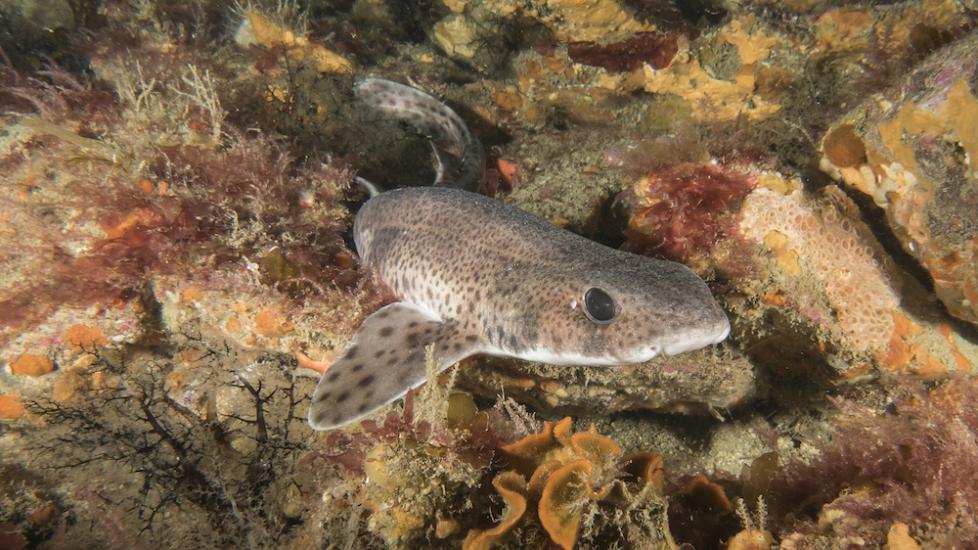Top Saltwater Shark Species for Aquariums
Interested in adding a shark to your saltwater aquarium? First, seriously consider how much space and care these individuals require. Even major aquariums can have issues taking care of these wonderful species. If you’re up for the challenge, a shark aquarium is a unique view of the underwater ecosystem and can be exceedingly enjoyable.
What Saltwater Sharks Can You Keep in an Aquarium?
All shark species should only be kept by expert saltwater owners who have many years’ experience working with saltwater environments, life support, and various species.
Epaulette Sharks (Hemiscyllium ocellatum)
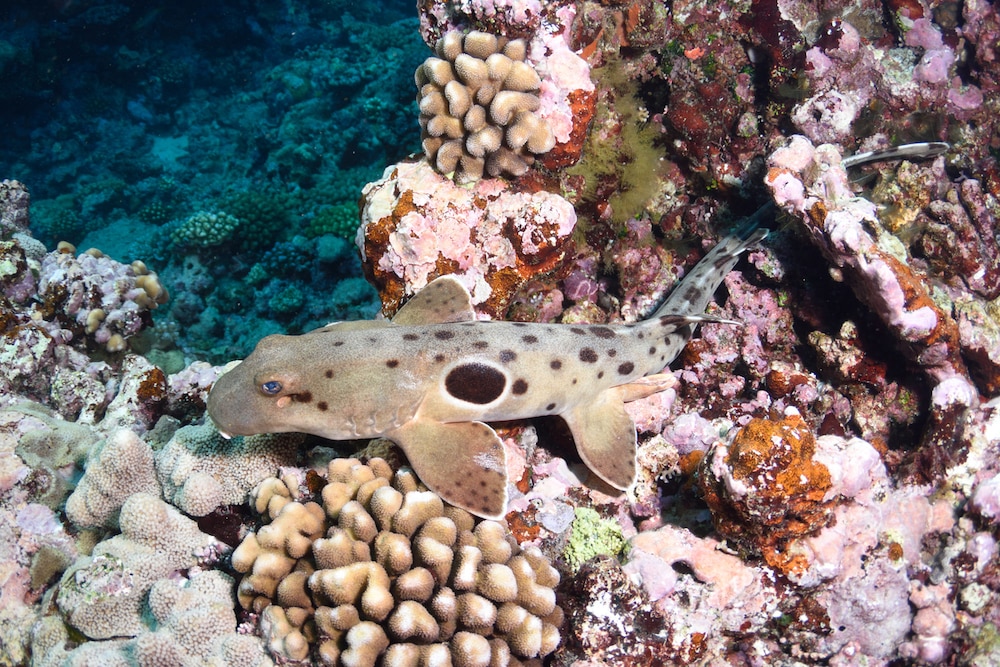
Native to Northern Australia and New Guinea, the Epaulette shark has a light tan body with brown bands and black spots. They are nocturnal animals, so don’t expect them to be active during the day. They tend to like living on the bottom of your aquarium and may even “walk” about using their ventral fins. This can be a long-lived species of shark, living up to 20-25 years.
The Epaulette Shark is one of the smaller shark species, but can grow up to 42” and will do so very quickly. They require a minimum of 350 gallons of water per individual but can be kept in a group (preferably single-sex) and a very robust filtration system and sandy substrate. Carefully consider any additional fish or invertebrates that may be kept in your tank in addition to any decorative items. Since these sharks are bottom dwellers, you will need to leave a considerable portion of your tank bottom as substrate-only.
Cat Shark (various species)

There are over 150 species of cat sharks, named for their whisker-like barbels at the front of their mouths. Some common species include: Coral Catshark, Australian Marbled Catshark or the Banded Sand Catshark. The largest of these species can grow up to 60” and may need up to 500 gallons for only one shark. Before bringing one of these cat shark species home, be sure to do your research so you can provide the correct environment and food source to keep your shark happy and healthy.
Horn Shark (Heterodontus francisci)
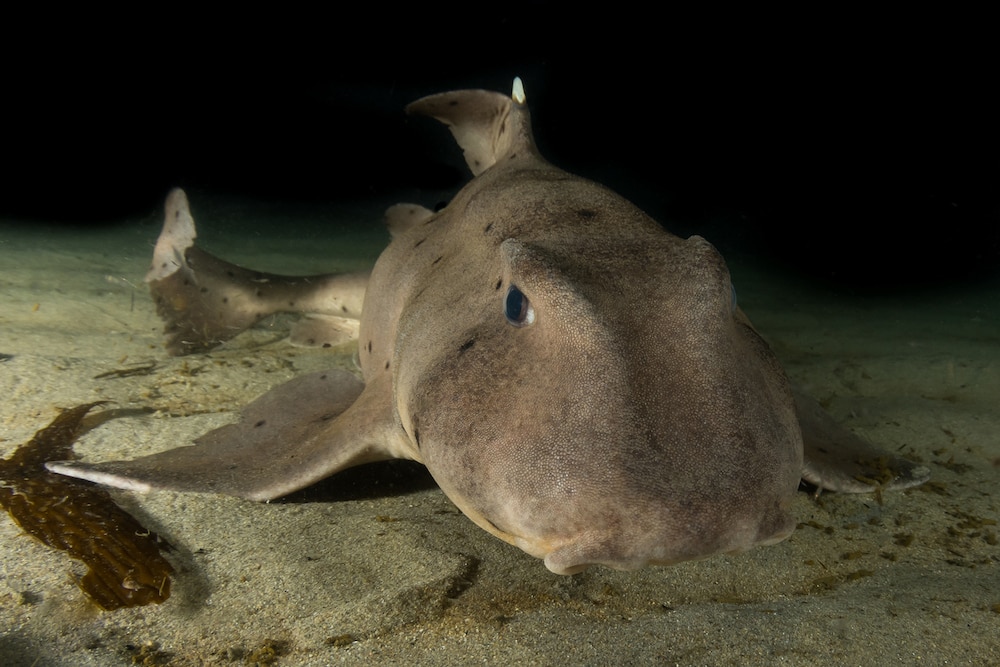
The Horn Shark is named for their spines at the leading edge of their dorsal fins. Special handing precautions must be taken when dealing with this species of shark. Horn Sharks are typically brown on the back and tan on the bottom with dark spots sprinkled along their bodies. They are also primarily nocturnal fishes that will hide in caves and crevices during the day.
The Horn Shark can be very aggressive and will require a minimum of 500 gallons per fish. It is not recommended to keep more than one Horn Shark in a tank. An individual can grow up to 4’ long, so be sure to choose a tank that will be wide enough for them to turn around comfortably in addition to having enough water. Carefully select other species for your Horn Shark tank, because they may become dinner.
Short Tail Nurse Shark (Pseudoginglymostoma brevicaudatum)
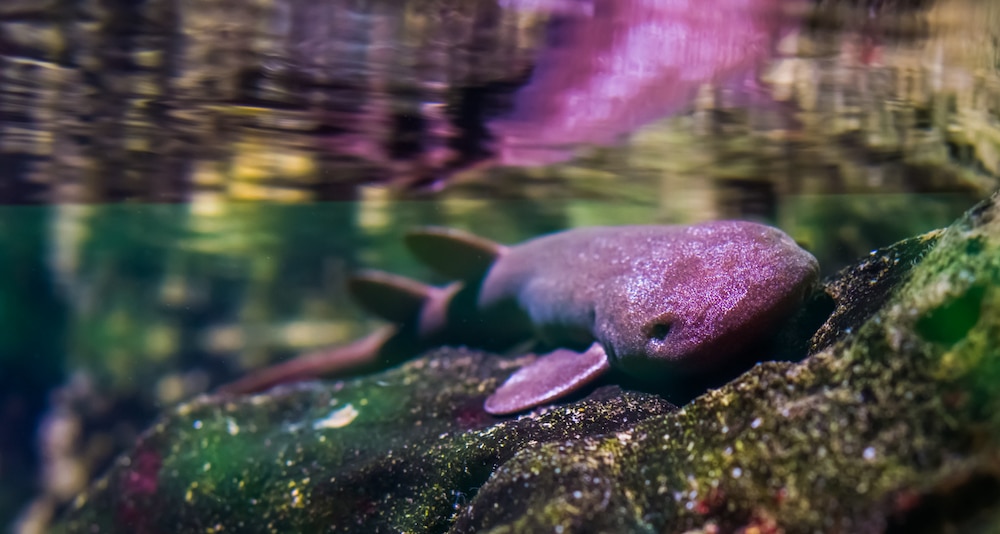
The Short Tail Nurse Shark is the smallest member of the Nurse Shark family at only 30” long. They are relatively peaceful sharks with a dark brown coloration. Native to the Western Indian Ocean, they have a uniquely shortened extra fin before their tail which gives them their name. Plan for a long life with your Short Tail Nurse Shark, with one individual living over 30 years!
One of the more docile shark species, the Short Tail Nurse Shark can grow up to 30” making it the smallest species on this list. It can also have periods of laying on its side, which can be very concerning for novice shark keepers, but is completely normal for these sharks. Be sure to have plenty of space for your Short Tail Nurse Shark with a tank of at least 300 gallons.
Speckled Carpet Shark (Hemiscyllium trispeculare)
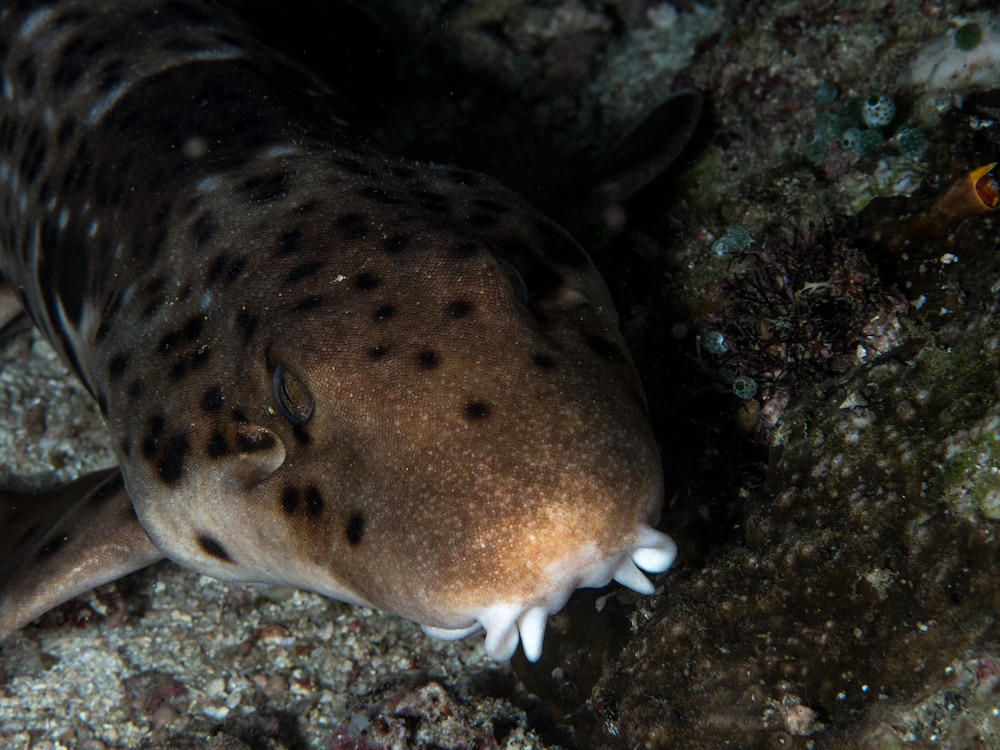
The Speckled Carpet Shark, native to Australia, are benthic or bottom-dwelling sharks with a tan and brown banded coloration with characteristic ocelli or “epaulettes” (dark round patch with a light border) right behind their pectoral fins. These sharks have small, rounded pectoral and pelvic fins that can be used to “walk” along the bottom of their aquarium.
Although they like to remain on the bottom of their tank, they do exhibit periods of free swimming and have a varied diet of small fish, crustaceans, cephalopods, and bivalves. They can grow up to 31” long and will do OK in small groups. You will need at least 300 gallons per shark with lots of bottom space and open upper water column for free swimming.
What Is the Best Saltwater Aquarium Shark?
Best First Saltwater Shark
If you are certain you are ready for a shark, the best species to start with would be the Short Tail Nurse Shark or Epaulette Shark. Both of these species are fairly docile and can be kept in small groups. They are both nocturnal species, so don’t expect them to do much during the day and both will require bottom feeding.
What Is the Smallest Saltwater Shark for an Aquarium?
The smallest saltwater sharks that can be kept in captivity are the Spotted Bamboo Shark, the Short Tail Nurse Shark and the Speckled Carpet Shark. These sharks will all max out around 30”.
Which Shark Is Easiest to Care For?
There is no “easy care” shark species. Any shark species requires considerable planning, preparation, patience, and care. No shark should be kept on a whim. These are very fussy aquarium species and should only be kept by experts with considerable saltwater aquarium experience.
Which Sharks Are Least Aggressive?
Nocturnal, bottom-dwelling sharks typically are the least aggressive captive saltwater sharks. From the list provided above, this would include the Epaulette, Short Tail Nurse and Speckled Carpet Sharks. However, just because they are the least aggressive does not mean that basic safety should be ignored! These sharks may not have large, pointy teeth, but they can still bite and their sandpaper-like skin can cause abrasions.
Saltwater Shark Care Tips
When it comes to keeping saltwater sharks, you must be very familiar with keeping a saltwater system. Sharks are extremely delicate animals and have very strict environmental and water quality requirements.
Cleaning Recommendations for Sharks
Sharks require pristine water quality, so you should have a vigorous cleaning routine and test your parameters daily. Many smaller shark species will be bottom-dwelling species, so ensure your substrate is comfortable sand that is frequently cleaned and not getting sucked into your filtration.
Size of Your School
Of the shark species listed in this article, the Epaulette and Short Tail Nurse Shark can be kept in a small school. Please be aware that these fish will require considerable water volume to be kept in a school. It is not recommended to keep multiple Horn or Speckled Carpet Sharks together in one tank.
Best Food for Aquarium Sharks
Most saltwater sharks are carnivorous and will need a diet of whole fish and invertebrates, such as squid. Some sharks tend to be picky eaters, but it is best to try and offer a varied diet. Be sure to include whole animals with all their internal organs! Your sharks will gain a lot of nutrition from whole animals rather than just filets. It is strongly recommended that all sharks kept in captivity be given additional supplementation through shark-specific vitamin and mineral supplements.
How to Feed Saltwater Sharks
Depending on the type of shark you select, their feeding may vary. Bottom dwelling sharks will likely be fed by food attached to a long pole and tucked gently under their nose. Mid-level sharks may be able to free-feed, but it is strongly recommended that you feed each shark individually using a target pole. This will allow you to know exactly what each shark is eating and provide supplementation if necessary.
Featured Image: iStock.com/RJGimages
